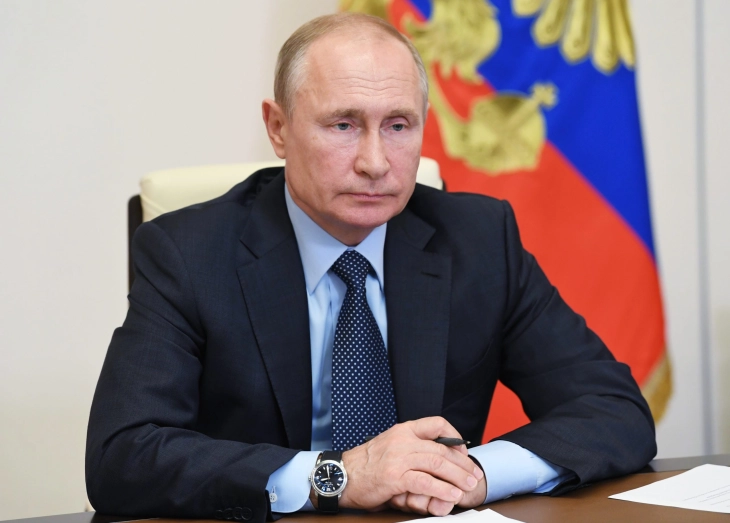Putin: Russia to station tactical nuclear weapons in Belarus
- Russian President Vladimir Putin said tactical nuclear weapons will be stationed in the former Soviet republic of Belarus, in another escalation of the hostilities between Moscow and the West.
- Post By Nevenka Nikolik
- 13:15, 26 March, 2023

Moscow, 26 March 2023 (dpa/MIA) - Russian President Vladimir Putin said tactical nuclear weapons will be stationed in the former Soviet republic of Belarus, in another escalation of the hostilities between Moscow and the West.
The Russian and Belarusian governments were in agreement on the decision, Putin said on state television on Saturday evening.
He said Russia was not violating any international nuclear non-proliferation treaties by moving the weapons to Belarus, which shares a border with Ukraine and NATO members Poland, Lithuania and Latvia.
Putin pointed out that the US also has nuclear weapons stationed with allies in Europe. "We are just doing what they have been doing for decades."
Belarus is closely allied with Russia. Long-time ruler Alexander Lukashenko, whose re-election as president in 2020 is not recognized by the West, is militarily, politically and economically dependent on Moscow.
At the start of the all-out invasion of Ukraine in February 2022, Russian units had also entered from Belarusian territory.
Lukashenko has asked for nuclear weapons to be stationed on the country's territory for years, Putin said.
Russia has delivered to Belarus the Iskander missile system that is capable of carrying nuclear weapons. Training in Belarus is to begin on April 3 and by July 1 the construction of a shaft for the weapons in Belarus will be completed, he said.
There was no immediate information provided by Minsk.
The United States had "long deployed" nuclear weapons in countries it is allied with, Putin argued, saying that Russia was doing nothing "unusual."
As to why the decision was taken now, Putin said it was a response to the planned delivery from Britain to Ukraine of armor-piercing rounds that contain depleted uranium.
Britain's Defence Ministry said this month that the shells had been standard equipment for decades, posed zero nuclear threat and accused Moscow of waging a disinformation campaign.
Putin said uranium ammunition is "among the most harmful and dangerous for humans" because the uranium nucleus causes radioactive dust and contaminates the soil.
"We have, without exaggeration, hundreds of thousands of such shells," he said. But so far they have not been used, he added.
There have been fears that the Russian military could use a tactical nuclear weapon in Ukraine in order to achieve results more quickly in the war it has been waging for more than a year.
Russia had already helped Belarus to convert aircraft, 10 of which were now equipped to launch tactical nuclear weapons as well, Putin said.
Tactical nuclear weapons usually have a far shorter range than nuclear weapons mounted on intercontinental ballistic missiles (ICBMs).
Germany's Foreign Office spoke on Saturday evening of a "further attempt at nuclear intimidation."
"The comparison drawn by President Putin to NATO's nuclear sharing is misleading and cannot be used to justify the step announced by Russia," the office said.
Moreover, Belarus had committed itself internationally in several declarations to be free of nuclear weapons, it added.
Under NATO's nuclear sharing programme, US nuclear weapons stationed in Europe can also be used by partner states' aircraft in an emergency to combat enemy forces, for example.
The International Campaign to Abolish Nuclear Weapons (ICAN) said Putin's plan is an "extremely dangerous escalation which makes the use of nuclear weapons more likely."
"In the context of the war in Ukraine, the likelihood of miscalculation or misinterpretation is extremely high," the organization wrote on Twitter on Saturday.
ICAN emphasized that the UN Treaty on the Prohibition of Nuclear Weapons (TPNW) prohibits states from allowing foreign nuclear weapons on their territory.
The treaty, adopted in 2017, has so far been signed by 92 states. Russia and Belarus are not among them. States with US nuclear bases - Germany, Belgium, Italy, the Netherlands and Turkey - have also not agreed.
In December, Putin said the threat of nuclear war was increasing but not on account of any action he had taken, insisting the country's nuclear arms were solely for the protection of Russia and its allies.
Russia's military strategy, he said at the time, envisions the use of weapons of mass destruction only in response to an attack. "That means if a strike is launched against us, we will strike back in response," Putin said. Russia sees the weapons as a "natural deterrent," he said.
Meanwhile, on Saturday night, Putin said that Russia was increasing its production of tanks.
"The total number of tanks of the Russian army will exceed that of Ukraine's by three times, even more than three times," Putin said.
While Ukraine will get 420 to 440 tanks from the West, Russia will build 1,600 new tanks or modernize existing ones, he said.







